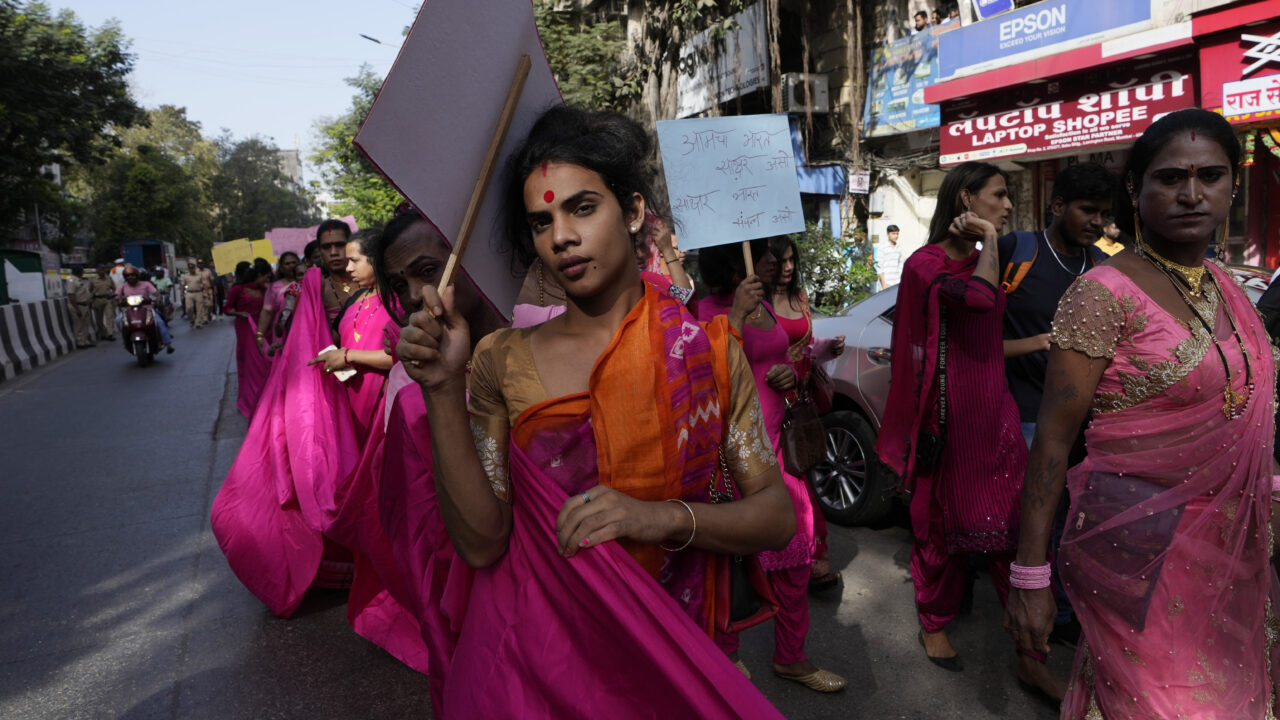The Struggles of India’s Trans Community
Despite facing discrimination and abuse, trans people in India are creating new lives for themselves. Members of the transgender community participate in the Pink Rally in Mumbai, India. Photo: Rajanish Kakade / AP.
Members of the transgender community participate in the Pink Rally in Mumbai, India. Photo: Rajanish Kakade / AP.
The transgender community in India has historically been marginalised and discriminated against, socially, economically and politically. Trans individuals are viewed by many as abnormal or deviant, and face physical and emotional violence and abuse, including sexual assault. Many incidents go unreported due to fear of retribution or lack of legal recognition.
“Around 80% of transgender people in India are either engaged in sex work or begging, and a large number of them face gender-based abuse and violence,” said Mumbai activist Abhina Aher.
Most trans people (often referred to as hijras or Kinnars) have difficult childhoods and also face significant challenges in adulthood. Activists say they face discrimination on all fronts including education and employment, and that it can be difficult to obtain identity documents such as passports, voter IDs and driving licences.
Activists say that while the treatment of transgender individuals in India has been a subject of concern for many years, under the Bharatiya Janta Party (BJP) there have been several developments and policy changes that have impacted the community.
In 2019, when the BJP swept the elections for the second time, the Indian government under Narendra Modi introduced the Transgender Persons (Protection of Rights) Bill in parliament, which aimed to provide legal protection to the transgender community and prevent discrimination against them.
However, it faced criticism from the community as well as the activists who argue that “the rules being framed violate the provisions of the Act itself.”
The BJP was also criticised for its lack of action on other LGBTIQ issues, such as providing legal recognition for same-sex marriage, protecting queer individuals from discrimination (for example, trans and gay people were barred from donating blood) and providing access to healthcare.
In particular, the trans community struggles to access affordable and quality healthcare. When it comes to gender-affirmation surgery, “the process is punishing and burdensome,” said Abhina, and expensive, costing from 300,000 to 800,000 rupees (about £3,000 to £8,000), a prohibitive sum for many trans individuals.
According to the 2011 census, there are 480,000 trans people in the country, although activists believe that is a massive underestimation, saying 1.5 million may be a more accurate figure.
Whatever the true total, very few are registered on the government’s National Portal for Transgender Persons, established in 2020 by the Department of Social Justice & Empowerment. Those who register are given a nationally recognised transgender certificate and ID card, which is necessary if they want to get government support for gender-affirming surgery.
According to veteran trans activist Amrita Sarkar, from HIV charity Alliance India, fewer than 14,000 people in total are registered “because the documentation process is hard and there is a lack of knowledge among the trans community”. Activists also say the portal has had bad publicity because people have not received the benefits promised.
openDemocracy spoke to five individuals, to hear their own personal experiences of being trans in India.
Growing up in a middle-class family in Mumbai, Sheikh faced pressure from both her family and wider society because she didn’t conform to the expectations of gender stereotyping.
Aqsa Sheikh
Aqsa Sheikh was about to undergo breast implant surgery a few years ago when the operation was unexpectedly delayed. Her mother, who was with her in hospital but had never approved of her transitioning, was delighted and saw it as a sign from the universe, Sheikh recalled. “She was happy and told me that I should not go against God’s will, despite the fact that I had been taking hormones for some time.”
However, the 40-year-old’s decision to have surgery came after years of struggle and trauma, and she was not about to give up. “I booked another date with the doctor and had the implants,” she said.
A doctor herself and a professor of community medicine at a Delhi university, Sheikh is well known for her trans activism, speaking frequently about the challenges faced by her community and other marginalised groups in India.
openDemocracy spoke to her on a sunny February day in New Delhi, after she’d given a talk about vaccine equity for transgender and disabled people. She described the life that she was living now as a dream come true, but said she could not stop thinking about her traumatic past and her journey to reach this point.
Growing up in a middle-class family in Mumbai, Sheikh faced pressure from both her family and wider society because she didn’t conform to the expectations of gender stereotyping. At school, she endured bullying and teasing. “I had no friends, and it was traumatic,” she said.
At puberty, she began experiencing changes in her body that felt alien and uncomfortable. At the age of 17, she had a reckoning with her identity and the uneasiness she had been feeling when she received a diagnosis of gender identity disorder from a kind and receptive doctor. “This helped me understand and come to terms with my true self,” she explained.
Then came her next struggle: to tell her family that she wanted to transition, something she felt was a cure for “what was ailing” her. She wrote a letter to her brother, whose only reply after days of avoiding the subject was: “Let’s not talk about it again.”
To try to stop her from transitioning, her family invoked the demands of religion and society. When Sheikh did not relent, she was subjected to emotional torture and prevented from doing ‘girly’ things. “I was stopped from cooking. I was told marriage was the solution to my thoughts,” she said, describing the pain she experienced during those years of loneliness. She said she felt suicidal.
Her family forced her to cut off contact with her beloved nephew, which she found particularly painful. “That was soul-crushing, but I had made up my mind about transition,” she said.
Despite her family’s lack of support, Vashi remains determined to go through with gender-confirmation surgery within the next year.
Eventually, at the age of 28, ”because the torture was becoming unbearable”, she found the courage to leave Mumbai to start a new life in New Delhi. She began her transition by taking hormones. “I told my mother and she said she was going to die [of shame]. I said: ‘If I don’t do it, I will die,’” she explained.
Although the demons of her past have passed, Sheikh, who has amassed thousands of followers on various social media platforms, remains concerned about her Muslim identity.
“I’m worried because the Muslims in the country are being targeted frequently which adds another layer of fear in our lives,” she says.
Sheikh is referring to the current state of affairs in India, where Muslims have become targets of right-wing groups and an unsympathetic media.
Sowmya Gupta
More than 25 years ago, Sowmya Gupta left her home in Vijayawada on India’s east coast to embark on a daunting 1,000-kilometre journey to Mumbai on the opposite side of the country. She remembers sitting in a train, the rainstorm lashing the windows mirroring her emotions.
Then 18, she was scared but determined as she left everything she had ever known behind in Andhra Pradesh. Due to her transgender identity, she had endured years of mistreatment, including being sent to an all-boys school. “I really didn’t want to go to that school,” said Gupta, now 44, showing a photograph of her first day at the educational institution.
Talking about that long-ago journey, she said: “I still can’t believe I was able to leave, but I was hopeful of a better life in a metropolis like Mumbai.”
At first, her life was very difficult. She lived in a cramped slum, sharing a small room with eight others – a very different experience to her middle-class upbringing with a private bedroom. “To survive, I had to take to sex work and begging,” she said, her voice trembling.
After some years, Gupta was determined to do what she had originally come to Mumbai for. “The [gender] dysphoria was making it harder for me and I decided to transition,” she said. She started taking hormones, but experienced health problems: “I began having breathing issues and my lungs were affected.”
Refusing to give up, she chose a riskier and more painful way to end her struggles with her gender identity. “I had castration surgery in 2003. it cost me 8,000 rupees [about £80],” she said.
Today she is a board member of Tweet Foundation, a community organisation for trans people, with bases in Delhi and Mumbai.
Maya Vashi
Aqsa Sheikh was fortunate to have her mother by her side in hospital. But others, like Maya Vashi, face the most important experience of their lives all alone.
Despite her family’s lack of support, Vashi remains determined to go through with gender-confirmation surgery within the next year. “I am hopeful that my family will eventually accept this, but right now I want to decide my own future,” she said. “I feel trapped in a body that doesn’t feel like mine and I need to change that.”
This month, she begins hormone therapy, marking a significant milestone in her transition journey. “It’s a dream come true,” she said. But it’s emotionally taxing, too, and she wishes she could have the support of her family.
Originally from Kanpur in the northern state of Uttar Pradesh, the 31-year-old has been working various jobs in New Delhi in order to save money for the surgery. Her transition journey has been also hampered by documentation problems, she said, specifically with getting a transgender certificate. Lack of education about the process among the transgender community, though not an issue in Vashi’s case, makes this a common problem.
Shanaya
Shanaya*, a 35-year-old trans woman from a village in Haryana state, northern India, shared a similar story of struggle and loneliness. At the age of 15, she was abandoned by her family, who told her to leave home. Her stepmother believed she was a bad omen for her own children, and Shanaya’s father did not intervene to protect her. “They thought I was a curse just because I was born different,” Shanaya said.
In adulthood, Shanaya found support and friendship within the LGBTIQ community, who helped her raise the money she needed to undergo gender-affirmation surgery. “I will always be grateful to them for helping me realise my dream of feeling like a woman,” she said.
Desperate to undergo surgery and lacking other options, Shanaya ended up having the procedure done at a clinic with a dubious track record. ”The doctor asked for less money, and I had no option but to go there,” she said.
Trans activists claim that potentially dangerous genital surgeries are still prevalent in India, especially in rural areas where unlicensed medical professionals perform them on trans people seeking gender confirmation surgery.
Trans men also face more difficulties in accessing gender-affirmation surgery, particularly bottom surgery, according to Khare.
Rudra
Rudra, 29, left his home town of Bulandshahr in Uttar Pradesh a decade ago in order to be true to himself. Since then, he has lived in three different cities to avoid the pain of not being recognised as a man.
Rudra (who requested that we did not use his full name) said that in Bulandshahr he feels invisible and nobody understands his identity. “My family has no understanding of gender identity or my identity as a trans man. When I tried to talk to them about it, they did not understand and acted as if the conversation never happened.”
He added: “I have lived in Mumbai and Bengaluru, and now I live in New Delhi. Although I miss living with my family, I don’t have to go through the torture of being the elder daughter.”
When he did return home, he was taken to neighbours’ homes to show them that he had not eloped. “My family kept on telling them: ‘Our daughter is not like others – she respects traditions,’” Rudra said.
According to queer activist Avali Khare, who is transmasculine, trans men and transmasculine individuals experience a different form of stigma from trans women: “They don’t have the same visibility or presence that trans women have, whether that’s culturally, socially or historically.”
Indian society already marginalises women and exerts a lot of control over their mobility and sexuality, which makes it difficult for them to escape the family fold.
Their families don’t see trans men or transmasculine people as having their own autonomy or agency, and blame others for influencing them, Khare said.
Trans men also face more difficulties in accessing gender-affirmation surgery, particularly bottom surgery, according to Khare. “There is not enough knowledge in the community about bottom surgery, and the doctors and healthcare providers who perform this surgery are few and not well known,” they said, adding that these procedures can be risky in India.
Many NGOs help transgender people in India, both with surgery and their welfare.
Rudra was determined to continue with his top surgery, and was lucky to get financial and medical help from an Indian NGO.
He has also been taking hormones, which have deepened his voice. “My family was taken aback when they heard my voice. They have no idea what it means to be a trans man,” he said. While his family is concerned with preserving their reputation, Rudra’s priority is living his life under his true identity.
Alongside other trans men who are healing from their surgeries, Rudra is currently being cared for by Tweet Foundation, in a short-stay shelter house in Delhi where Sowmya Gupta works. “She understands our struggles and treats us very well,” he said.
Your support matters…Independent journalism is under threat and overshadowed by heavily funded mainstream media.
You can help level the playing field. Become a member.
Your tax-deductible contribution keeps us digging beneath the headlines to give you thought-provoking, investigative reporting and analysis that unearths what's really happening- without compromise.
Give today to support our courageous, independent journalists.









You need to be a supporter to comment.
There are currently no responses to this article.
Be the first to respond.